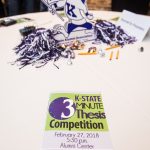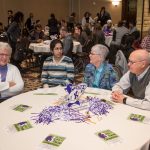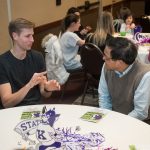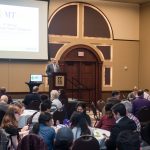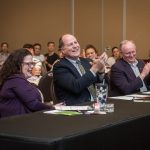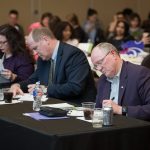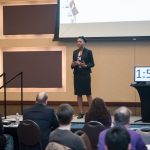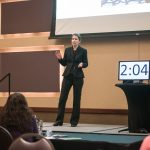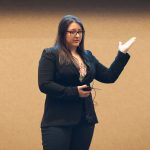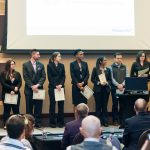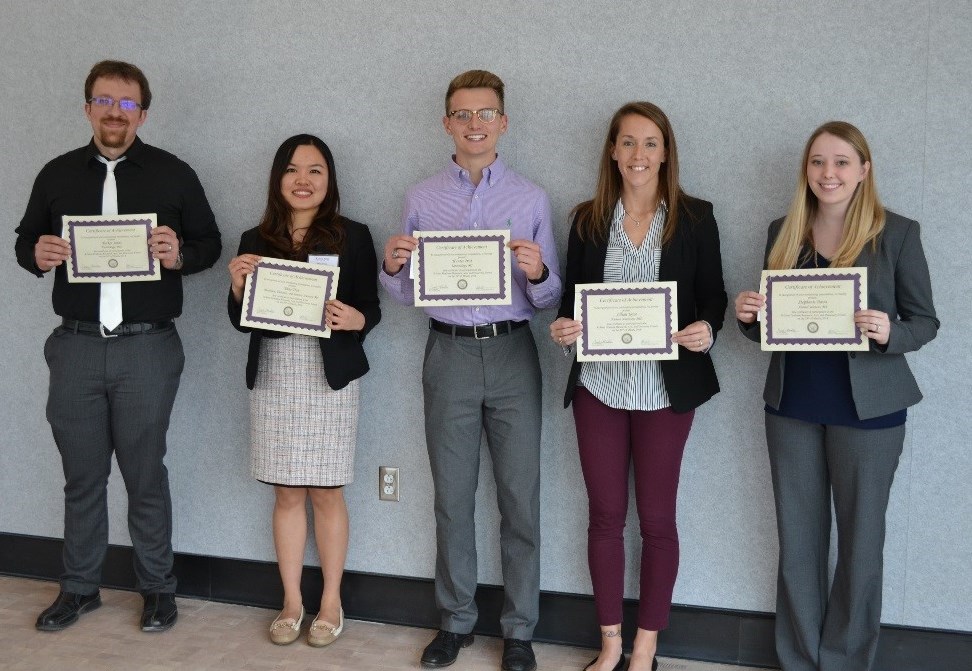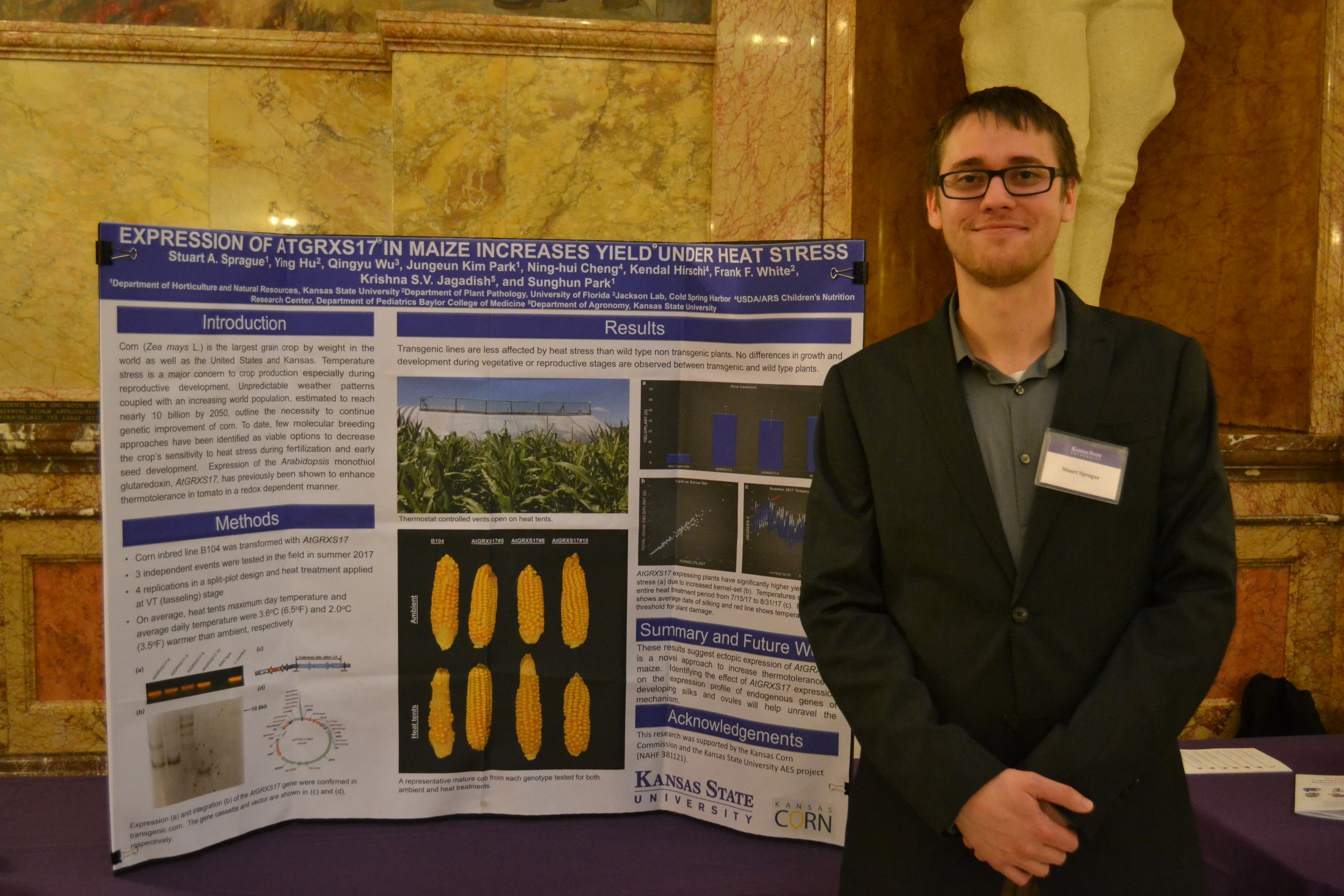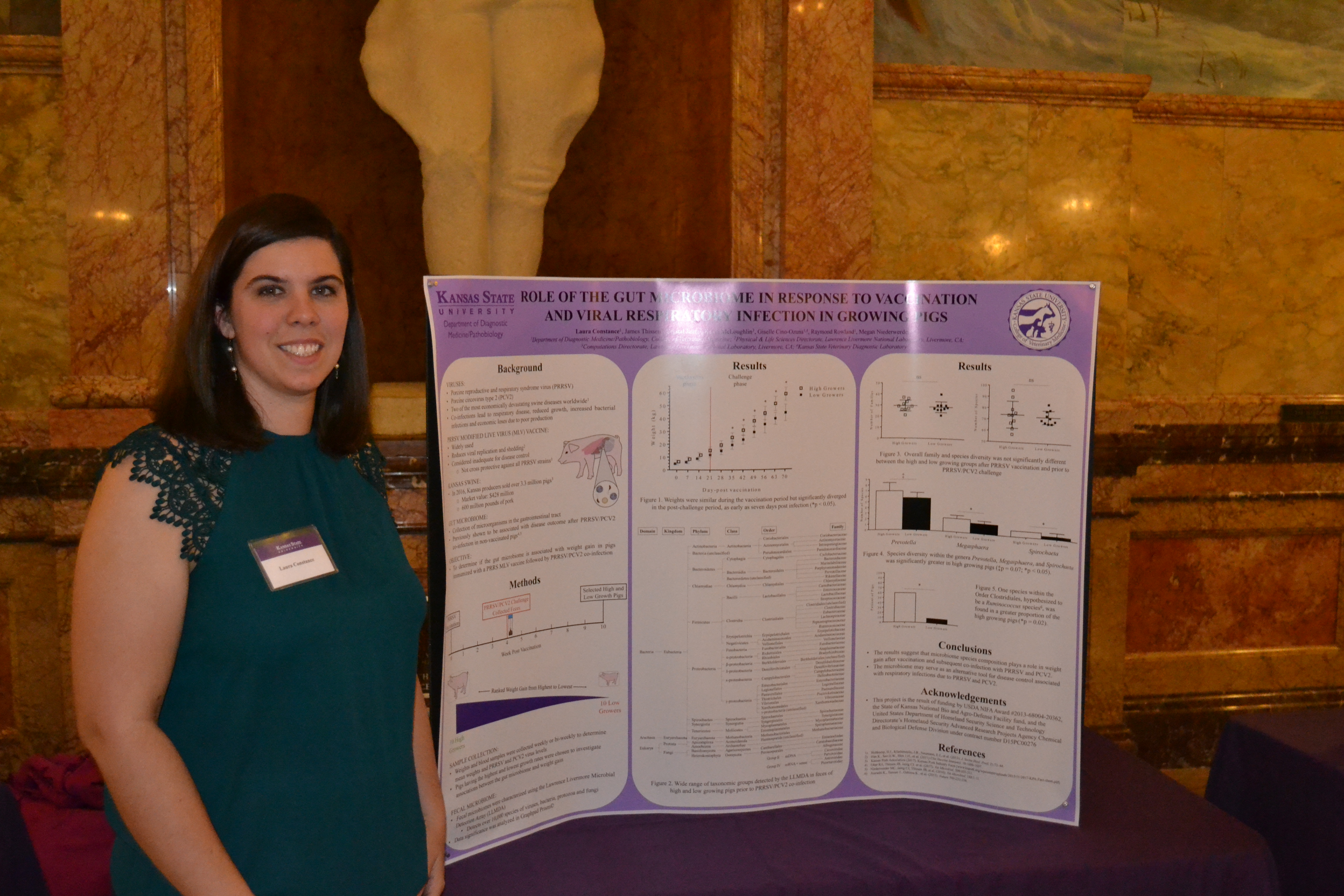This article highlights some current student successes.
- 2018 Three Minute Thesis Competition
- K-State Graduate Research Arts, and Discovery Forum
- 15th Annual Capitol Graduate Research Summit
Three-minute victory: Counseling and student development doctoral student tops 3MT competition
A Kansas State University graduate student’s ability to explain his research about prospective engineering students and first-year retention to the public in a relatable way earned him a chance to discuss his research on a regional stage.
Dave Hoffman, doctoral student in counseling and student development from Lenexa, won first place at Kansas State University’s Three Minute Thesis, or 3MT, competition for his presentation “Purple Stride: Prospective Engineering Students and First-Year Retention.” The final competition was held February 27th and featured Hoffman and seven other finalists: Rachel Wilkins, master’s student in entomology, Overland Park; Sam Sharpe, doctoral student in biology, San Rafael, California; Catherine Steele, doctoral student in psychology, Katy, Texas; Gabriela Magossi, master’s student in food science, and Vinicius Perin, master’s student in agronomy, both from Brazil; and Nethali Fernando, doctoral student in mathematics, Sri Lanka. The finalists were selected following the first round of the competition on February 13th, which featured nearly 40 graduate students.
3MT participants were challenged with explaining their research in three minutes or less without the use of notes and with the support of only a single, static PowerPoint slide. Judges for the final competition were Gene Taylor, the university’s athletic director; Jackie McClaskey, Kansas secretary of agriculture; and Brad Everett, manager of Manhattan’s Hilton Garden Inn.
As the first-place winner, Hoffman received a $500 scholarship. Hoffman’s major professor is Christy Craft, associate professor of special education, counseling and student affairs. He represented Kansas State University in the 2018 Midwestern Association of Graduate Schools’ Three Minute Thesis Competition, April 4-6, in Grand Rapids, Michigan.
Hoffman believes his experience in the Three Minute Thesis Competition will help with his goal of developing a program that encourages students from underrepresented populations to pursue and graduate with degrees in engineering.
“By practicing a more concise and coherent version of my research proposal in front of groups both large and small, I feel more prepared to give similar presentations to legislators, lawmakers, company executives, and potential benefactors that could all positively shape a program of this undertaking,” Hoffman said. “Should the opportunity present itself, I know that my participation in the Three Minute Thesis competition will have significantly impacted my educational and professional aspirations.”
Tennecia Dacass, doctoral student in economics, Jamaica, won second place and $250 for her presentation on “Intergenerational Effects of Mass Incarceration.” She also earned a $125 scholarship as the People’s Choice winner, which was selected by an audience of K-State faculty, students, and staff, as well as Manhattan community members. Dacass’ major professor is William Blankenau, professor and head of economics department.
“I decided to participate in the competition because I knew it would provide me an outlet to share my research in a nonacademic manner,” Dacass said. “I wanted to challenge myself to convey what I have been working on in a simplified manner, and I knew that was one of the main goals of the 3MT competition.”
The 3MT competition is a means for graduate students to develop their communication skills, particularly their ability to concisely communicate the significance of their work in a way that can be understood and appreciated by individuals outside of their discipline. Reports from employers, such as Google, indicate a need for employees to be able to communicate highly complex information in a way that can be understood by diverse audiences. Not only is the 3MT an excellent professional development experience for graduate students, but it also provides an opportunity for the Manhattan community to learn about our graduate students’ scholarly work.
The Three Minute Thesis is an academic competition first developed by the University of Queensland of Australia. Competitions are now conducted at more than 600 universities in 65 countries.
Eleven graduate students earn scholarships at campuswide research forum
First-place winners of the annual K-State Graduate Research, Arts, and Discovery Forum. From left: Tucker Jones, Thao Tran, Hunter Post, Jillian Joyce, and Stephanie Davis. Not pictured are Chelsea Dixon, Nicholle Hatton, Ying Lin, Joel Steyer, Weilun Tsai, and Rachel Wilkins. | Download this photo.
Oral and poster presentations of their research earned 11 Kansas State University graduate students first-place honors at the annual K-State Graduate Research, Arts and Discovery, or GRAD, Forum.
This year, 85 graduate students competed for scholarship awards. The GRAD Forum provides graduate students from all disciplines an opportunity to share their work with the university community and gain experience presenting their work in a professional setting. The forum included oral and poster presentations on topics in engineering, social sciences, humanities, education, agricultural sciences, math, physical sciences, biological sciences, and interdisciplinary research.
University faculty and postdoctoral fellows selected the top presenters in each session. An awards ceremony included a special presentation from Timothy Keane, distinguished graduate faculty member and professor in the department of landscape architecture and regional & community planning. First-place winners received $500 scholarships and their names were engraved on a perpetual plaque for their presentation category. The plaques will be displayed in winners’ departments until the 2019 GRAD Forum.
The GRAD Forum is sponsored by the Graduate School, the Graduate Student Council, the offices of the President and Provost, the Office of the Vice President for Research, and K-State’s chapter of Sigma Xi, the scientific research society.
GRAD Forum first-place winners:
• Hunter Post, master’s student in kinesiology, Beloit, in the biological sciences oral 1 category. Post’s major professor is Carl Ade, assistant professor of kinesiology.
• Joel Steyer, doctoral student in plant pathology, Lenexa, in the biological sciences poster category. Steyer’s major professor is Richard Todd, associate professor of plant pathology.
• Rachel Wilkins, master’s student in entomology, Overland Park, in the biological sciences oral 2 category. Wilkins’ major professor is Kun Yan Zhu, university distinguished professor of entomology.
• Stephanie Davis, master’s student in animal sciences, Silver Lake, in the agricultural sciences oral presentation category. Davis’ major professor is John Gonzalez, associate professor of animal sciences and industry.
• Tucker Jones, master’s student in psychology, Mosca, Colorado, in the social sciences/humanities/education oral category. Jones’ major professor is Mark Barnett, professor of psychological sciences.
• Nicholle Hatton, master’s student in biological and agricultural engineering, Parker, Colorado, in the engineering/math/physical sciences oral category. Hatton’s major professor is Ajay Sharda, assistant professor of biological and agricultural engineering.
• Jillian Joyce, doctoral student in human nutrition, Greensburg, Pennsylvania, in the social sciences/humanities/education poster category. Joyce’s major professor is Sara Rosenkranz, assistant professor of food, nutrition, dietetics and health.
• Chelsea Dixon, doctoral student in biological and agricultural engineering, San Antonio, Texas, in the engineering/math/physical sciences poster category. Dixon’s major professor is Lisa Wilken, assistant professor of biological and agricultural engineering.
• Ying Lin, doctoral student in economics, China, in the social sciences/humanities/education oral 2 category. Lin’s major professor is Philip Gayle, professor of economics.
• Weilun Tsai, master’s student in nutrition, dietetics and sensory sciences, Taiwan, in the interdisciplinary research poster category. Tsai’s major professor is Kadri Koppel, assistant professor of food, nutrition, dietetics and health.
• Thao Tran, master’s student in nutrition, dietetics and sensory sciences, Vietnam, in the agricultural sciences poster category. Tran’s major professor is Edgar Chambers IV, university distinguished professor of sensory analysis.
Kansas-related research wins two graduate students honors at State Capitol event
Stuart Sprague, a doctoral student in horticulture at Kansas State University, received recognition for his research on heat stress in corn at the 15th Capitol Graduate Research Summit. | Download this photo.
Two Kansas State University graduate students received statewide recognition for their Kansas-related research at the 15th Capitol Graduate Research Summit, March 27, at the State Capitol in Topeka.
Stuart Sprague, doctoral student in horticulture, Manhattan, and Laura Constance, doctoral student in pathobiology, Clyde, North Carolina, were the two Kansas State University winners at the summit. Constance was the university’s winner of the scholarship award presented by BioKansas.
The BioKansas award not only recognizes the top researchers, but also those projects that have the best potential for commercialization and for impacting the state of Kansas, said Dennis Ridenour, president and CEO of BioKansas.
The Capitol Graduate Research Summit is a statewide event that features current research of graduate students at Kansas State University, the University of Kansas, the University of Kansas Medical Center, Wichita State University, Fort Hays University, Emporia State University and Pittsburgh State University. Each university invited a university professor and an industry representative to judge the student poster presentations. The top presenters from each university received awards.
Sprague’s poster was “Expression of ATGRXS17 in maize increases yield under heat stress.” His work is funded by the Kansas Corn Commission and his adviser is Sunghun Park, associate professor of horticulture and natural resources.
Sprague’s research focuses on increasing heat tolerance in corn, which can severely impact seed development. This research is important to Kansas because corn is one of the state’s most economically important crops and, in the face of a growing world population, Kansas wants to continue its status as a leader in food production.
“Attending the Capitol Graduate Research Summit was a fantastic experience,” Sprague sad. “I met some amazing people and had great discussions. This experience helped me realize that my public speaking skills have improved and I’m honored to have won because the other presenters’ work was all very impressive and had unique important implications for Kansas.”
Laura Constance, doctoral student in pathobiology, was Kansas State University’s winner of the BioKansas scholarship at the 15th Capitol Graduate Research Summit. Constance researches alternative methods to help control and treat respiratory disease in swine. | Download this photo.
Constance’s poster was “Role of the gut microbiome in response to vaccination and viral respiratory infection in growing pigs.” Her research is funded by USDA NIFA Award #2013-68004-20362, the State of Kansas National Bio and Agro-Defense Facility fund, and the United States Department of Homeland Security Science and Technology Directorate’s Homeland Security Advanced Research Projects Agency Chemical and Biological Defense Division under contract number D15PC00276. Constance’s advisors are Megan Niederwerder, assistant professor of diagnostic medicine and pathobiology with the K-State Veterinary Diagnostic Laboratory, and Raymond Rowland, professor of diagnostic medicine and pathobiology.
Constance’s research goal is to use alternative methods, such as fecal microbiota transplantation, to help control and treat respiratory disease in swine. Her work with swine could benefit not only swine health, but also have more broad implications in other food animals and advance science as a whole.
“It is an honor to receive the BioKansas Award and I look forward to working more with them in the future,” Constance said. “Our goals are intertwined in that we are both dedicated to helping advance and promote bioscience research. Kansas is 10th in the nation for swine production and in 2017 sold approximately 3.3 million swine with a market value of about $468 million.”
